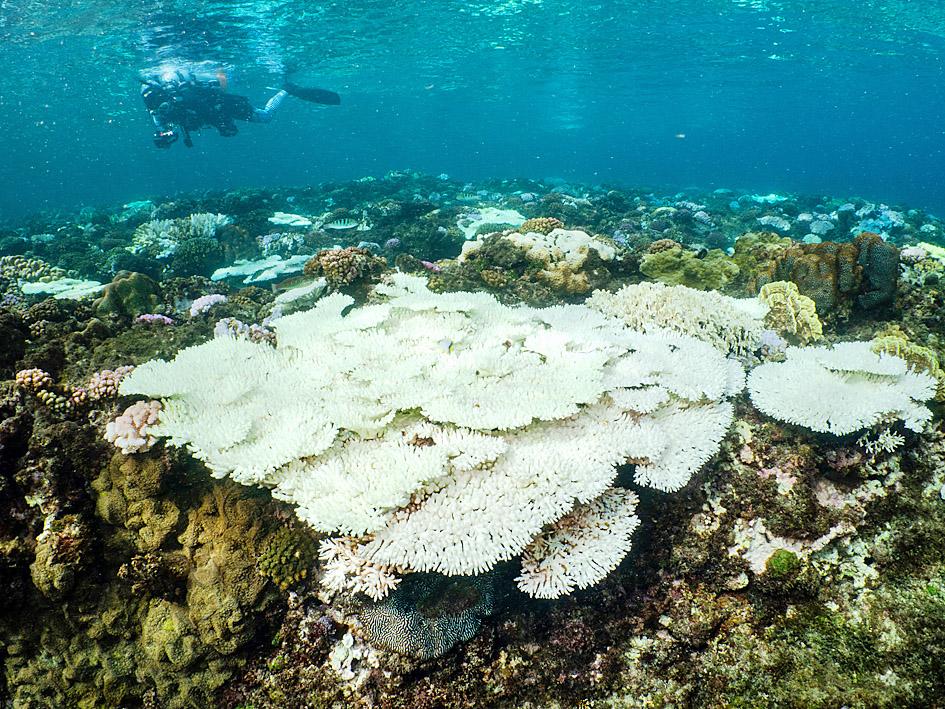At least 31 percent of the coral reefs in waters around Taiwan are dying as a result of bleaching, which is now the worst in its recorded history, researchers from Academia Sinica and the Taiwan Coral Bleaching Observation Network (TCBON) said yesterday, echoing warnings first delivered in September.
The network said that 52 percent of the coral in the nation’s waters is under different levels of heat stress, while 31 percent is in an irreversible process of dying due to high water temperatures.
The coral reefs would not recover, even if the water temperatures fall, said Kuo Chao-yang (郭兆揚), a postdoctoral research associate at Academia Sinica’s Biodiversity Research Center and a TCBON member.

Photo: CNA
The coral bleaching, the worst since the government began keeping such records in the 1980s, was a result of global warming and a low incidence of typhoons in the country last summer, he said.
Average sea temperatures around the nation last year rose to the highest in two decades, Kuo said, citing an average 30.5°C in waters off the north coast last summer, about 1°C above normal.
The optimal water temperature for coral growth is 18°C to 29°C, and in unfavorable conditions, most corals expel their symbiotic algae, causing bleaching or even death, Kuo said.
The areas around Taiwan where the worst bleaching occurred last year were Liouciou Island (琉球), Kenting, the northeast coast, Penghu and Green Island (綠島), he said.
Mingo Lee (李世明), a diver who helps document the condition of Taiwan’s coral, said the underwater temperature near uninhabited Siji Island (西吉) in Penghu County was about 34°C when he dove there last year.
“It was white everywhere, like snow,” he said, describing the coral. “I had never seen anything like that in my 20 years as a diver.”
The massive coral bleaching in Taiwan is worrisome because it threatens biodiversity, said Allen Chen (陳昭倫), an Academia Sinica researcher and one of the founders of TCBON.
Chen said a more aggressive approach to reducing greenhouse gas emissions is needed.
If carbon emissions could be halved by 2030 to 2016’s level, carbon neutrality might be achieved by 2050, he said.
As a result, global warming would be limited to 1.5°C, which would save 30 percent of coral reefs worldwide, he said.
Greenpeace Taiwan has said that coral reef communities around Taiwan make up less than one-1,000th of the world’s in terms of scale, but they account for one-third of the various species globally.
Of the 700 species of stony corals worldwide, 250 can be found along the coast of Taiwan, it said.
Greenpeace Taiwan on Sept. 10 last year said that the coral bleaching in the waters off Kenting was the worst it had seen since 1998, while on Oct. 8, Biodiversity Research Center researchers told a Taipei news conference that last year saw the most severe and extensive coral bleaching since Academia Sinica began monitoring the nation’s near-coast reefs in 2012.
Greenpeace Taiwan representatives told the news conference that local governments should declare a “climate emergency” to help save the nation’s coral reefs.

AGING: As of last month, people aged 65 or older accounted for 20.06 percent of the total population and the number of couples who got married fell by 18,685 from 2024 Taiwan has surpassed South Korea as the country least willing to have children, with an annual crude birthrate of 4.62 per 1,000 people, Ministry of the Interior data showed yesterday. The nation was previously ranked the second-lowest country in terms of total fertility rate, or the average number of children a woman has in her lifetime. However, South Korea’s fertility rate began to recover from 2023, with total fertility rate rising from 0.72 and estimated to reach 0.82 to 0.85 by last year, and the crude birthrate projected at 6.7 per 1,000 people. Japan’s crude birthrate was projected to fall below six,

Conflict with Taiwan could leave China with “massive economic disruption, catastrophic military losses, significant social unrest, and devastating sanctions,” a US think tank said in a report released on Monday. The German Marshall Fund released a report titled If China Attacks Taiwan: The Consequences for China of “Minor Conflict” and “Major War” Scenarios. The report details the “massive” economic, military, social and international costs to China in the event of a minor conflict or major war with Taiwan, estimating that the Chinese People’s Liberation Army (PLA) could sustain losses of more than half of its active-duty ground forces, including 100,000 troops. Understanding Chinese

US President Donald Trump in an interview with the New York Times published on Thursday said that “it’s up to” Chinese President Xi Jinping (習近平) what China does on Taiwan, but that he would be “very unhappy” with a change in the “status quo.” “He [Xi] considers it to be a part of China, and that’s up to him what he’s going to be doing, but I’ve expressed to him that I would be very unhappy if he did that, and I don’t think he’ll do that. I hope he doesn’t do that,” Trump said. Trump made the comments in the context

SELF-DEFENSE: Tokyo has accelerated its spending goal and its defense minister said the nation needs to discuss whether it should develop nuclear-powered submarines China is ramping up objections to what it sees as Japan’s desire to acquire nuclear weapons, despite Tokyo’s longstanding renunciation of such arms, deepening another fissure in the two neighbors’ increasingly tense ties. In what appears to be a concerted effort, China’s foreign and defense ministries issued statements on Thursday condemning alleged remilitarism efforts by Tokyo. The remarks came as two of the country’s top think tanks jointly issued a 29-page report framing actions by “right-wing forces” in Japan as posing a “serious threat” to world peace. While that report did not define “right-wing forces,” the Chinese Ministry of Foreign Affairs was